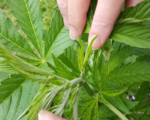The U.S. Department of Energy is investing $5 million in a groundbreaking study to assess the impact of hemp cultivation and biochar on soil health. With researchers from Western Washington University, Pacific Northwest National Laboratory, and the University of Connecticut on board, the six-year project is expected to shed light on the long-term agricultural benefits of these practices.
Why Hemp and Biochar Are Gaining Attention
Farmers and scientists alike have been increasingly interested in hemp as a rotational crop, and biochar— a charcoal-based soil additive— as a potential soil enhancer. While each has been studied separately, this research aims to see how they work together to improve soil conditions for various crops, including wheat, corn, and chickpeas.
Biochar is known to improve soil aeration, retain nutrients, and support beneficial microbial activity. Hemp, on the other hand, has deep roots that help break up compacted soil and absorb carbon. The study will examine whether using both could create a more fertile and sustainable farming system.

The Research Plan and What It Could Mean for Farmers
Led by David Gang, director of the WSU Center for Cannabis Policy, Research, and Outreach, the study will measure the effects of hemp and biochar on soil health over multiple growing seasons.
- Researchers will analyze soil samples before and after planting hemp and other crops.
- They will test whether biochar improves moisture retention and nutrient availability.
- Hemp’s role in carbon sequestration and soil regeneration will be assessed.
If the findings confirm that these practices boost soil productivity, it could lead to policy changes supporting wider adoption of biochar and hemp in large-scale farming.
Federal Interest and the Future of Sustainable Agriculture
Federal agencies have been ramping up investment in sustainable agriculture, with an emphasis on soil conservation and climate resilience. The U.S. Department of Energy’s funding for this study highlights the government’s focus on exploring alternative farming methods that can reduce reliance on synthetic fertilizers and improve long-term soil health.
Hemp was reintroduced as a legal crop in the 2018 Farm Bill, and since then, its uses have expanded beyond textiles and CBD production. With its potential role in regenerative agriculture, this study could provide the scientific backing needed to make hemp a staple in U.S. farming.
What’s Next?
The research team will begin field trials in different climates and soil types, gathering data over the next six years. Their findings could provide valuable insights for policymakers, farmers, and environmentalists interested in sustainable agricultural practices.
For now, all eyes are on the researchers as they seek to unlock new ways to improve soil health— and potentially reshape modern farming.
Maria Garcia is an award-winning author who excels in creating engaging cannabis-centric articles that captivate audiences. Her versatile writing style allows her to cover a wide range of topics within the cannabis space, from advocacy and social justice to product reviews and lifestyle features. Maria’s dedication to promoting education and awareness about cannabis shines through in her thoughtfully curated content that resonates with both seasoned enthusiasts and newcomers alike.








